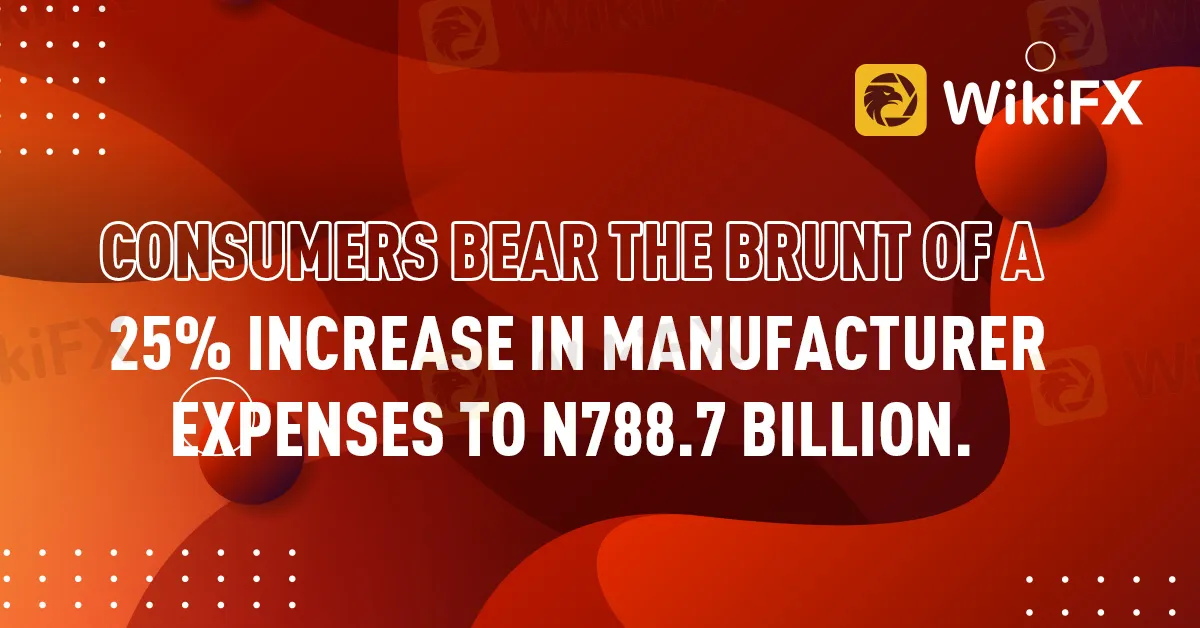简体中文
繁體中文
English
Pусский
日本語
ภาษาไทย
Tiếng Việt
Bahasa Indonesia
Español
हिन्दी
Filippiiniläinen
Français
Deutsch
Português
Türkçe
한국어
العربية
CONSUMERS BEAR THE BRUNT OF A 25% INCREASE IN MANUFACTURER EXPENSES TO N788.7 BILLION.
Abstract:Nigeria's consumer products manufacturing industry had a 25% increase in production costs in the first half of 2022, H1'22, despite the country's rising inflation. However, high cost is far more than the period's average inflation rate of 17%. This occurs despite the fact that the businesses are reporting slow growth and, in many instances, a flat reduction in output levels.

Nigeria's consumer products manufacturing industry had a 25% increase in production costs in the first half of 2022, H1'22, despite the country's rising inflation.
However, high cost is far more than the period's average inflation rate of 17%.
This occurs despite the fact that the businesses are reporting slow growth and, in many instances, a flat reduction in output levels.
Industry observers have identified a number of factors as the source of cost pressures, including concerns with energy costs related to fuel prices, rising foreign exchange costs for imported raw materials, high transportation costs, and higher labor costs, among others.
Nestle Nigeria Plc, Dangote Sugar, BUA Foods Plc, Nigerian Breweries, Guinness Nigeria Plc, Honeywell Flour Mills Plc, Cadbury Nigeria, PZ Cussons Industries, NASCO Allied Industries Plc, and GSK Consumer Nigeria Plc are among the businesses included in Financial Vanguard's findings basket.
Unilever Nigeria, Northern Nigeria Flour Mills, Union Dicon Salt Plc, Nigerian Enamelware Plc, International Breweries, Golden Guinea Breweries, Multi- Trex Integrated Foods Plc, among many others, are also among the cost leaders in the consumer products industry.
Top in rising costs
Among the companies with the highest costs is NASCO, which had an increase of nearly 57.6% to N16.8 billion in H1'22 from N10.6 billion in H1'21. Following closely after was GSK Consumer Nigeria Plc, whose operational costs increased by 56.1% to N11.0 billion from N7.1 billion in H1'21, and by 54.0% to N2.2 billion from N1.4 billion at Champion Breweries.
Nestle Nigeria Plc reported a cost increase of 43.4% to N75.3 billion from N52.5 billion in H1'21 and a cost increase of 41.9% to N146.6 billion from N103.5 billion in HI'21 for Dangote Sugar.
Companies with high production costs include BUA Foods Plc, which had the highest cost in H1 of 21 at N168.9 billion, Nigerian Breweries, which had a cost of N146.6 billion, and Dangote Sugar, which had a cost of N146.6 billion. Nestle reported N75.3 billion and Guinness Nigeria Plc N134.2 billion respectively.
The consumer products industry had revenue growth, which appears to be a consequence of the high cost of production that was passed on to consumers, despite the fact that inflation, rising unemployment, and other macroeconomic headwinds during the time period reduced consumers' purchasing power.
These companies' turnover and profit growth rates in H1'22 both exceeded the growth rates of the GDP and inflation, which were 3.54 percent and 18.6 percent, respectively, in the first half of the year.
In particular, the combined revenue of the 18 top firms in the manufacturing of consumer goods climbed by 29.6% to N1.16 trillion in H1'22 from N892.3 billion in H1'21.
Even more remarkably, their Profit Before Tax (PBT) increased from N 111.4 billion in H1'21 to N 173.85 billion in H1'22, a 56.1 percent increase.
Analysts highlighted that the Consumer Goods sector's performance was being held back by inflationary growth and added that, based on their turnover level, they must have passed along much more to consumers than their expenses, which had reduced effective demand.
However, given the remarkable achievement in their profit growth rate, they observed that the majority of the companies also did well in cost management.

Disclaimer:
The views in this article only represent the author's personal views, and do not constitute investment advice on this platform. This platform does not guarantee the accuracy, completeness and timeliness of the information in the article, and will not be liable for any loss caused by the use of or reliance on the information in the article.
Read more

Bank Negara Malaysia Flags 12 New Companies for Unauthorised Activity
Bank Negara Malaysia (BNM) has updated its Financial Consumer Alert List (FCA List) by adding 12 more entities, reinforcing its efforts to warn the public against unregulated financial schemes. Check if your broker made the list!

TradingView Brings Live Market Charts to Telegram Users with New Mini App
TradingView has launched a mini app on Telegram, making it easier for users to track market trends, check price movements, and share charts.

March Oil Production Declines: How Is the Market Reacting?
Oil production cuts in March are reshaping the market. Traders are closely watching OPEC+ decisions and supply disruptions, which could impact prices and future production strategies.

How to Calculate Leverage and Margin in the Forex Market
Leverage amplifies both potential profits and risks. Understanding how to calculate leverage and margin helps traders manage risks and avoid forced liquidation.
WikiFX Broker
Latest News
Exposing the Top 5 Scam Brokers of March 2025: A Closer Look by WikiFX
Gold Prices Climb Again – Have Investors Seized the Opportunity?
Webull Launches SMSF Investment Platform with Zero Fees
Australian Regulator Warns of Money Laundering and Fraud Risks in Crypto ATMs
The Withdrawal Trap: How Scam Brokers Lure Victims into Paying More
FCA to Investors: Think Twice Before Trusting These Brokers
Trump\s tariffs: How could they affect the UK and your money
Trump gambles it all on global tariffs he\s wanted for decades
TradingView Brings Live Market Charts to Telegram Users with New Mini App
HTFX Spreads Joy During Eid Charity Event in Jakarta
Currency Calculator







